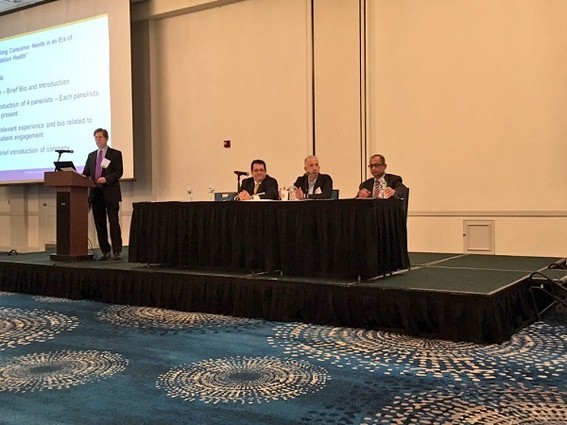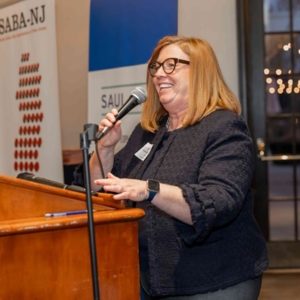Using Technology to Help Patients Make Better Care Decisions is Essential, HIMSS NJ Panel Says

| Esther Surden
At the joint winter conference of the New Jersey chapters of HIMSS and the Healthcare Financial Management Association, held on Jan. 28, a panel discussion addressed how the use of technology can allow patients to make their own healthcare decisions and participate in preventive medicine.
The panel was moderated by Alan Gilbert, chief growth officer at TEAM of Care (Fort Lee); and included panelists Dr. Shafiq Rab, vice president and CIO, Hackensack University Medical Center; Dr. Christopher Valerian, chief medical officer, Qualcare (Piscataway); and Dr. Mark Bowman, of Healthgrades (Denver).
All of the panelists had significant experience in developing technologies that could change patient self-care, and they were approaching the issue in different ways.
Asked by Gilbert how their companies were enabling patients’ self-care through technology, Bowman, for example, discussed an ongoing initiative at Healthgrades to create virtual case managers for people who are not ill enough to require a hands-on human case manager.
“We can only afford so many live case managers,” he explained, especially for people who are well most of the time. So Healthgrades has developed a set of technologies that can approximately replicate the case manager virtually.
The technology incorporates the idea of “communications between doctor visits,” taking into account not only the patient’s medical information, but also personal information such as who is in his household, the languages he speaks, etc. It involves a to-do list for individuals and includes patient education. Healthgrades is piloting this technology with four regional health systems.
Qualcare, an insurance platform company owned by Cigna, is working to incentivize people to pay attention to their own health by providing easy access to a platform and paying them to take care of items the company believes are important, according to Volarian.
For example, Volarian noted that he had been an avid Fitbit user for several years and always tracks his food. When he joined Qualcare and went on his employer’s platform, he was told that he could make as much as $1,000 a year by checking off the things he was willing to do. One of them was register a Fitbit, which he did easily. Another was to track his food intake. “I checked through the list and checked off the easy ones for me. Logging my food is something I’ve been doing.”
The “nirvana for us is that you can take this list and all the other technologies that come out in the future, mash them together in a usable way, and put them where people will go: on the phone, on a desktop, in whatever format they choose and interact with the system. Then give them the incentives to use it.”
This system gives people control over their health. “It all goes back to tying all these things together in a user-friendly way and aligning those incentives appropriately,” he said.
Speaking last on the topic, Rab said that HackensackUMC is trying to create a continuum from home to the workplace, the doctor’s office, the hospital and the nursing home.
HackensackUMC has partnered with Apple Health, Google and others. For example, a doctor will assign her patient an app. If the doctor prescribes that the patient walk a mile, and he stops after a half mile, the app will encourage him to continue and remind him that this is what the doctor wanted. It creates the feeling that the doctor and the health care system care about you, about what you do and how well you comply. All of these apps are for behavior modification, “to help us understand prevention,” he said.
Another initiative at HackensackUMC involves “banking” medical records, he noted. Rab told the audience that a lot of his medical information is at HackensackUMC, but some is at Kaiser Permanente. “The offices in these places keep your information. … If I ask you, ‘do you have your health information with you,’ you’d have to say no. But if I ask you if you have your banking information, if you know how much money you have in your account, you’d say yes.”
“This is the paradigm shift we are working on at Hackensack. We are saying that the power has to go back into the hands of the patient. And the patient — and that includes me — should be able to have their own data and control which ‘bank’ it goes into,” such as vaults provided by Apple or Google.

